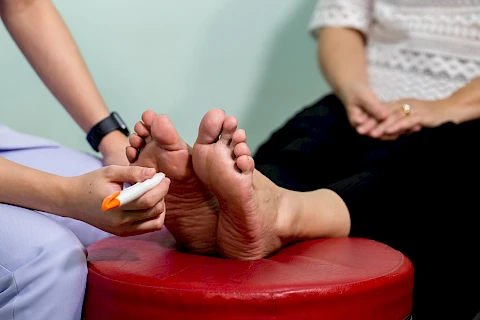
Diabetic neuropathy is a common complication of diabetes that affects many seniors. It involves nerve damage that can lead to discomfort and serious health issues if not properly managed. For caregivers, understanding diabetic neuropathy is critical in helping seniors maintain a high quality of life. Recognizing the symptoms and knowing how to manage them can make a significant difference in the well-being of seniors living with this condition.
What Is Diabetic Neuropathy?
Diabetic neuropathy refers to a type of nerve damage. It typically develops after blood sugar levels remain high for an extended time. It often affects the nerves in the legs and feet but can occur in other parts of the body. In seniors, this condition can be particularly challenging due to age-related health changes that already make them more vulnerable. Neuropathy can lead to pain, numbness, and even muscle weakness, interfering with daily activities and increasing the risk of injuries.
Risk Factors
Several risk factors make seniors more susceptible to diabetic neuropathy. Persistent high blood sugar levels, high blood pressure, obesity, and a long history of diabetes are common contributors. Seniors who smoke or consume excessive alcohol also face a higher risk. Proper diabetes management is pivotal in reducing these risks. By maintaining healthy blood sugar levels, seniors can decrease the likelihood of developing neuropathy and its complications.
Symptoms to Watch For
Recognizing the symptoms of diabetic neuropathy early can prevent further complications. Common symptoms include:
- Tingling or burning sensation in the hands or feet
- Numbness or inability to feel pain or temperature changes
- Muscle weakness
- Balance issues
- Sharp pains or cramps
If you notice these symptoms in a senior with diabetes, consult a healthcare professional promptly. Early detection can help in managing the symptoms effectively.
The Importance of Regular Foot Exams
Foot health is a necessary consideration when working to manage diabetic neuropathy in seniors. Nerve damage can make it difficult for them to notice cuts, sores, or infections on their feet, which can lead to severe complications. Regular foot exams prevent these issues. As a caregiver, you can assist by checking the senior's feet daily for signs of redness, swelling, or wounds. Encourage them to wear comfortable shoes and keep their feet clean and dry.
Managing Neuropathy Symptoms
While diabetic neuropathy can be challenging, certain lifestyle changes and daily routines can help alleviate symptoms. Encourage seniors to maintain a balanced diet and avoid high-sugar foods. Regular, low-impact exercises like walking or swimming can also be beneficial. Seniors should follow a routine medication schedule as prescribed by healthcare providers. Using assistive devices like orthotic footwear can help relieve pressure on the feet.
Caregivers can support seniors by helping them adhere to these routines and providing encouragement. Consistent management is key to reducing discomfort and maintaining independence.
Preventing Complications
Preventing complications from diabetic neuropathy involves a proactive approach. A combination of healthy eating, regular physical activity, and strict medication adherence can help prevent further nerve damage. Seniors should monitor their blood sugar levels regularly and attend all medical appointments. Caregivers should remind seniors of these appointments and assist them with transportation if needed. Together, these measures can reduce the risk of serious complications.
Receive Care From Senior Helpers Corpus Christi
Understanding and managing diabetic neuropathy is necessary for seniors and their caregivers. By recognizing the symptoms, conducting regular foot exams, and encouraging a healthy lifestyle, caregivers can help seniors lead a more comfortable life. Act early and seek professional advice to manage this condition effectively. For those in Corpus Christi and the surrounding areas like Kingsville, Rockport, or Port Aransas, Senior Helpers Corpus Christi can provide support and resources designed to assist caregivers and seniors alike. Don't hesitate to contact us for guidance and assistance in managing diabetic neuropathy.